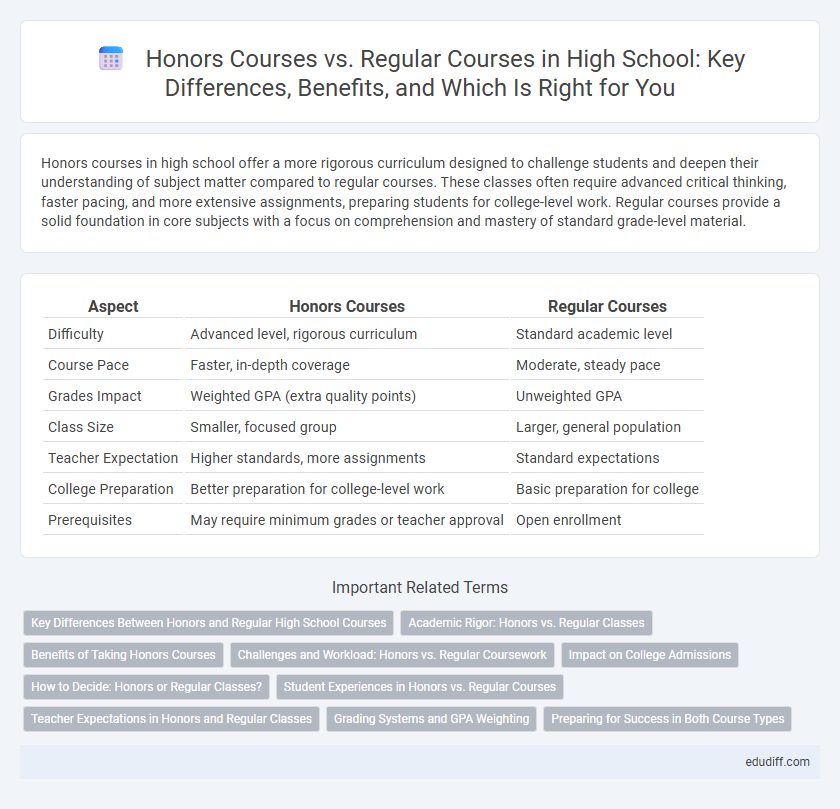Honors courses in high school offer a more rigorous curriculum designed to challenge students and deepen their understanding of subject matter compared to regular courses. These classes often require advanced critical thinking, faster pacing, and more extensive assignments, preparing students for college-level work. Regular courses provide a solid foundation in core subjects with a focus on comprehension and mastery of standard grade-level material.
Table of Comparison
| Aspect | Honors Courses | Regular Courses |
|---|---|---|
| Difficulty | Advanced level, rigorous curriculum | Standard academic level |
| Course Pace | Faster, in-depth coverage | Moderate, steady pace |
| Grades Impact | Weighted GPA (extra quality points) | Unweighted GPA |
| Class Size | Smaller, focused group | Larger, general population |
| Teacher Expectation | Higher standards, more assignments | Standard expectations |
| College Preparation | Better preparation for college-level work | Basic preparation for college |
| Prerequisites | May require minimum grades or teacher approval | Open enrollment |
Key Differences Between Honors and Regular High School Courses
Honors courses in high school offer more rigorous academic challenges, including advanced content and faster-paced instruction, compared to regular courses which follow the standard curriculum. Honors classes often require higher critical thinking skills, independent study, and produce better preparation for college-level work, while regular courses aim at mastering foundational knowledge. Grades in honors courses may carry weighted GPA points, providing students with opportunities to boost their academic transcripts beyond regular course standards.
Academic Rigor: Honors vs. Regular Classes
Honors courses in high school present a higher level of academic rigor compared to regular classes, featuring more challenging coursework, faster pacing, and in-depth discussions that demand critical thinking and advanced problem-solving skills. These classes often require students to engage with complex texts and complex concepts, preparing them for college-level expectations. Regular courses provide foundational knowledge and skills but typically at a slower pace and with less intensive workloads.
Benefits of Taking Honors Courses
Taking honors courses in high school enhances critical thinking skills and provides rigorous academic challenges that better prepare students for college-level coursework. These courses often result in higher weighted GPA points, improving class rank and college admission prospects. Exposure to advanced material fosters deeper subject mastery, encouraging intellectual growth and time management abilities.
Challenges and Workload: Honors vs. Regular Coursework
Honors courses demand increased critical thinking, faster pacing, and more extensive assignments compared to regular coursework, resulting in a higher academic workload. Students in honors classes often engage with complex concepts and analytical tasks that require deeper understanding and time investment. This intensified challenge prepares students for college-level expectations but can also lead to greater stress and time management demands.
Impact on College Admissions
Honors courses demonstrate academic rigor and can enhance a student's college application by showcasing their ability to handle challenging material. Colleges often weigh honors coursework more favorably than regular courses, as it signals preparedness for college-level studies. Students taking honors classes may also receive weighted GPA benefits, improving their overall academic profile for admissions decisions.
How to Decide: Honors or Regular Classes?
When choosing between honors and regular classes, students should evaluate their academic strengths, workload capacity, and long-term goals. Honors courses typically offer more rigorous content and can strengthen college applications, but require strong time management and commitment. Consulting with teachers, counselors, and reviewing past performance helps ensure the chosen level aligns with the student's abilities and aspirations.
Student Experiences in Honors vs. Regular Courses
Students in honors courses often report increased academic challenge and deeper engagement with the material compared to regular courses, fostering critical thinking and problem-solving skills. Honors classes typically offer smaller class sizes and more interactive discussions, contributing to a supportive yet rigorous learning environment. However, students in regular courses may experience a more balanced workload and diverse peer interactions, which can reduce stress and allow for broader extracurricular participation.
Teacher Expectations in Honors and Regular Classes
Teachers in honors courses expect a higher level of critical thinking, independent analysis, and deeper understanding of the material compared to regular courses. Honors classes demand consistent participation, extensive reading, and more complex assignments to challenge students. In regular courses, expectations often center on mastering fundamental concepts and developing foundational skills with structured guidance.
Grading Systems and GPA Weighting
Honors courses typically utilize a weighted grading system that adds extra points to the GPA scale, often boosting grades by 0.5 or 1.0 compared to regular courses, which follow the standard 4.0 scale. This weighting allows students in honors classes to achieve a higher weighted GPA, positively impacting their class rank and college admissions prospects. Regular courses maintain unweighted grades, providing straightforward GPA calculations but without the additional competitive advantage honors courses offer.
Preparing for Success in Both Course Types
Honors courses offer rigorous curriculum designed to develop advanced critical thinking and time management skills essential for college readiness, while regular courses provide a solid foundation in core subjects with a focus on mastering essential concepts. Success in honors requires proactive study habits and utilizing available resources such as tutoring and study groups, whereas excelling in regular classes benefits from consistent attendance and active class participation. Balancing the demands of both course types enhances academic versatility and builds resilience in diverse learning environments.
Honors Courses vs Regular Courses Infographic

 edudiff.com
edudiff.com